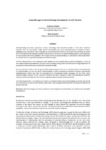
Please use this identifier to cite or link to this item:
http://ricaxcan.uaz.edu.mx/jspui/handle/20.500.11845/188| Title: | Inequality gaps in nanotechnology development in Latin America |
| Authors: | Foladori, Guillermo Invernizzi, Noela |
| Keywords: | Nanotechnology; Latin America; Science; Technology & Innovation Policy; Competitiveness; Equitable Development. |
| Issue Date: | Jul-2013 |
| Publisher: | MIR Center for Socio-Economic Research |
| Abstract: | Nanotechnology has been spurred by science, technology and innovation policies in most Latin American countries since the last decade. Public policies and funding have been accompanied by a common rhetoric, highlighting the potential of nanotechnology for increasing competitiveness and growth and providing the region with more efficient and innovative products. Based on an assessment of nanotechnology policies and capabilities in nine countries this article highlights three characteristics of nanotechnology in Latin America that might hinder its contribution to an equitable development within the region. The first characteristic is the conspicuous trend towards an intra-regional gap in capacity building as a result of the unequal historical development of science and technology among these countries and the large differences in equipment and financial resources devoted to nanotechnology. The second characteristic is the strength of “international signals” vis-à-vis the national needs in the orientation of nanotechnology. On the one hand, nanotechnology is main and foremost oriented to achieve international competitiveness, which may lead its development to international market demands. On the other hand, nanotechnology research in Latin American countries has been configured within internationalized academic networks, which may influence local research agendas towards foreign research priorities. The third characteristic is the absence of research on potential impacts of nanotechnology on human health and the environment, as well as other societal implications, which may generate new forms of unequal distribution of benefits and risks. |
| URI: | http://hdl.handle.net/20.500.11845/188 |
| ISSN: | 2167-9045 2167-9053 |
| Other Identifiers: | info:eu-repo/semantics/publishedVersion |
| Appears in Collections: | *Documentos Académicos*-- UA Estudios del Desarrollo |
Files in This Item:
| File | Description | Size | Format | |
|---|---|---|---|---|
| Foladori; Invernizzi. Inequality gaps.pdf | Versión publicada | 205,77 kB | Adobe PDF |  View/Open |
This item is licensed under a Creative Commons License
